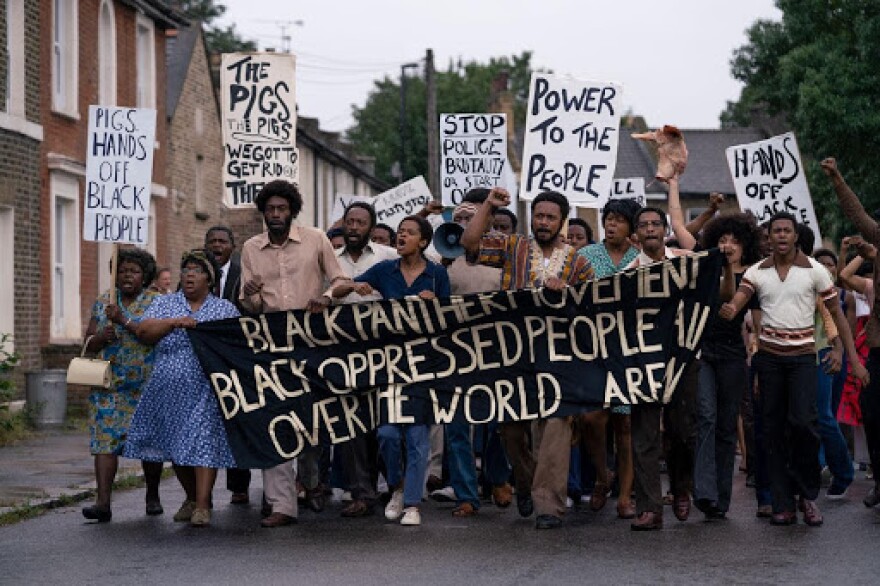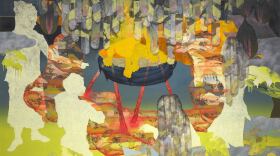Academy Award-winning director Steve McQueen took over a decade to fully realize his vision of a collection of stories about the West Indian community in London in the '60s, ‘70s and '80s. That idea came to life last month with the release of a five-part film anthology called "Small Axe." The films explore the joy and pain of life in this immigrant community — and its important contributions to London's history.
Host Anita Rao digs into this anthology with popular culture experts Natalie Bullock Brown and Mark Anthony Neal. The three also talk about HBO's visually stunning adaptation of Ta-Nehisi Coates' 2015 best-selling book "Between The World And Me." In the new film, Coates' singular story is told through a multi-generational chorus of voices, including actors, activists and the author himself.
They also commemorate the 50th anniversary of Donny Hathaway’s "This Christmas," which many cultural critics call a Black Christmas anthem. To celebrate this milestone, Rhino Records released a new animated music video featuring Hathaway strolling through the streets of Chicago in the 1970s. Plus, Rao, Brown and Neal break down the legacy of Patti LaBelle and critically examine last week’s execution of Brandon Bernard.
Natalie Bullock Brown is a filmmaker and teaching assistant professor at North Carolina State University. Mark Anthony Neal is the James B. Duke Professor and chair of the department of African and African American studies at Duke University and host of the webcast "Left of Black."
Interview Highlights
Neal: It is telling an intricate tale of these various moments, right? Some of them real, some of them fiction, that really encapsulate what it was — first of all, for that windrush generation, and then for their children, in the aftermath of that — that really explains the kind of development of a political consciousness.
Brown: I'm just thinking about "Lovers Rock" and just how the camera sort of floats through these dancers who are basically grinding during the ballads during the slow songs. And it is just beautiful. It's exquisite. It takes you back. If you've ever experienced a house party, you go right back to that. So there's a way that what McQueen does with these movies, these films is — it's really universal, even though it's a specific experience that he's talking about. I, as a Black woman who grew up in Chicago, Illinois, I know what that's about. And I think that's part of the brilliance.
Neal: I've always been a little lukewarm towards this book and also Ta-Nehisi’s work, in large part because it always felt to me that Ta-Nehisi was a byproduct of a certain kind of exceptionalism within African American Arts and Letters. You know, so much of his work seemed, at least in how people read it, to revolve around him. What I love about the film project, and kudos to Kamilah Forbes … is that it brought it back to a collective endeavor. He wasn't just reading a letter to his son. He was reading — they were all reading letters to all of our children in that moment.
Brown: My own experience with Howard is so much like what Susan Watson described. The Mecca does inject the students, it injects them with this belief in yourself, with this — just this embrace of Black beauty. And you do see yourself and all these different iterations on campus. It's one of the most incredible things that I've ever experienced. And I'm just forever grateful that I actually chose to go there for grad school because it made such a difference in who I am and how I see myself and certainly Black people.
Brown: There's a lot of pride that Chicago has in this native son, because Donny Hathaway, of course, is just this incredible singer who's completely underrated and whose life was cut way too short. But there's also the fact that this song, in particular, certainly transcends Chicago. I mean, it is the Black Christmas anthem throughout Black communities all over the country. ... He's so soulful in every song that he ever sang, but there's something about this song that really speaks to some of the work ethic and the striving of Black Chicago and the excellence. That's what I hear when I listen to it, and I think that's a part of its appeal.
Neal: And the irony of the song: It's a happy song. It's a joyful song. And there's not a lot of Donny Hathaway music that is happy and joyful, which suggests that there was something about the Christmas season and what was happening in his life at that time that we hear the song. There's also some irony that for many white audiences, the only Donny Hathaway song that they've ever heard is “This Christmas.” They don't know any of his other music. And I'm sure he would have a wry smile at the idea with all the great music that he did … that the most well-known song in his catalogue would be this Christmas song that he just happened to do.











